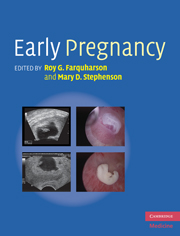Book contents
- Early Pregnancy
- Early Pregnancy
- Copyright page
- Contents
- Contributors
- Preface
- Chapter 1 Early pregnancy – models of healthcare
- Chapter 2 Risk factors for miscarriage
- Chapter 3 Ectopic pregnancy
- Chapter 4 Ultrasound detection of congenital uterine anomalies
- Chapter 5 Ultrasound and early pregnancy
- Chapter 6 Management of pregnancy loss
- Chapter 7 Investigation of recurrent miscarriage
- Chapter 8 Molar pregnancy
- Chapter 9 Uterine natural killer cells and reproduction
- Chapter 10 Cytogenetic factors in recurrent early pregnancy loss
- Chapter 11 Parental chromosome testing
- Chapter 12 Embryoscopy
- Chapter 13 Acquired thrombophilia and recurrent early pregnancy loss
- Chapter 14 Inherited thrombophilia and early pregnancy
- Chapter 15 Thrombosis, air travel and early pregnancy
- Chapter 16 Immunotherapy and early pregnancy
- Chapter 17 Endometrial receptivity
- Chapter 18 Clinical assessment of the endometrium
- Chapter 19 Implantation events
- Chapter 20 Recurrent implantation failure
- Chapter 21 Trophoblast biology and early pregnancy
- Chapter 22 Implantation failure:
- Chapter 23 Embryo reduction in multiple pregnancies
- Chapter 24 Miscarriage after in-vitro fertilization
- Chapter 25 Vanishing twin syndrome and long-term outcome
- Chapter 26 Late pregnancy loss
- Index
Chapter 9 - Uterine natural killer cells and reproduction
Published online by Cambridge University Press: 05 October 2010
- Early Pregnancy
- Early Pregnancy
- Copyright page
- Contents
- Contributors
- Preface
- Chapter 1 Early pregnancy – models of healthcare
- Chapter 2 Risk factors for miscarriage
- Chapter 3 Ectopic pregnancy
- Chapter 4 Ultrasound detection of congenital uterine anomalies
- Chapter 5 Ultrasound and early pregnancy
- Chapter 6 Management of pregnancy loss
- Chapter 7 Investigation of recurrent miscarriage
- Chapter 8 Molar pregnancy
- Chapter 9 Uterine natural killer cells and reproduction
- Chapter 10 Cytogenetic factors in recurrent early pregnancy loss
- Chapter 11 Parental chromosome testing
- Chapter 12 Embryoscopy
- Chapter 13 Acquired thrombophilia and recurrent early pregnancy loss
- Chapter 14 Inherited thrombophilia and early pregnancy
- Chapter 15 Thrombosis, air travel and early pregnancy
- Chapter 16 Immunotherapy and early pregnancy
- Chapter 17 Endometrial receptivity
- Chapter 18 Clinical assessment of the endometrium
- Chapter 19 Implantation events
- Chapter 20 Recurrent implantation failure
- Chapter 21 Trophoblast biology and early pregnancy
- Chapter 22 Implantation failure:
- Chapter 23 Embryo reduction in multiple pregnancies
- Chapter 24 Miscarriage after in-vitro fertilization
- Chapter 25 Vanishing twin syndrome and long-term outcome
- Chapter 26 Late pregnancy loss
- Index
Summary
Keywords
- Type
- Chapter
- Information
- Early Pregnancy , pp. 75 - 84Publisher: Cambridge University PressPrint publication year: 2010

